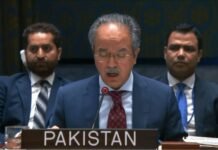Lusaka, 1 August 2022 (TDI): The International Monetary Fund (IMF) has pledged financial assistance to Zambia in response to its request for debt restructuring.
Zambia’s request was made according to the G20 States Framework, the State’s Finance Minister Situmbeko Musokotwane shared.
On Saturday, Kristalina Georgieva, the Managing Director of IMF, threaded on the liability for the funding program dealing with the debt setback.
Very pleased the Official Creditor Committee for Zambia has provided its financial assurances clearing the way for a Fund program. This shows the potential of the #G20CommonFramework for debt treatment to deliver for countries committed to dealing with their debt problems. [1/2]
— Kristalina Georgieva (@KGeorgieva) July 30, 2022
Moreover, Zambia’s G-20 creditor committee has seconded Zambia’s “envisaged IMF upper credit tranche program and its swift adoption by the IMF Executive Board”.
The respective press assertion was co-chaired by China and France while South Africa served as vice-chair. On the contrary, IMF and World bank representatives gathered remotely to review Zambia’s fiscal and economic position.
The reforms seek to remedy past weaknesses in economic governance and public financial management, leading to an unsustainable debt overhang.
Accordingly, IMF assistance coordinates the creditors’ assurance, which the Zambian government has received favorably.
In December, Zambia and the IMF negotiated a $1.4 billion accord, having three bridge loans, dependent on Zambia’s competence to trim down its indebtedness.
The bilateral creditor meeting scheduled and held in June assisted Zambia’s authorities. The Common Framework, a fiscal consolidation initiative inaugurated by the G20 in 2020, is the subject of current deliberations.
Additionally, Kevin Daly, who works as the head of a panel of Zambian Eurobond investors, appreciated the efforts of the remark posted by the bilateral creditors.
However, he reiterated a demand for transparency in the Debt Sustainability Analysis (DSA), the IMF report that serves as the dialogue’s preliminary step.
Backstory
President Hakainde Hichilema, alleged extravagant spending to be the ground for the deep recession of the former President, Edgar Lungu for his government’s profuse indebtedness.
Emphatically, the inflation dropped from 24% to 10% because the new administration was elected, says Musokotwane.








